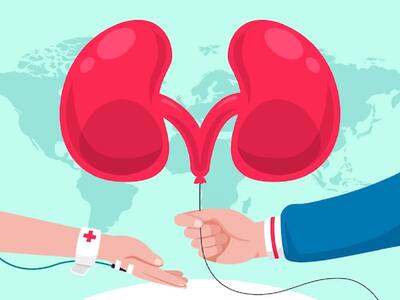
On World Organ Donation Day, a Renal Transplant Surgeon shares some must-follow tips that kidney donors should follow to maintain their quality of life and avoid health risks.
Donating a kidney or any organ for that matter can significantly impact a patient who needs organ transplant and improve their quality of life. For those with long-standing organ issues, a donor provides hope. In comparison to the rigors of dialysis, kidney transplants offer patients a better quality of life. In India, around 151 to 232 out of a million people need kidney transplants due to end-stage renal disease. On an average, this means approximately 2,20,000 Indians are in need of kidney transplants. Presently, 7,500 kidney transplants are conducted annually, with 90 per cent donations from living donors and 10 per cent from deceased donors.
The question often arises: Can kidney donors lead a normal life? On World Organ Donation Day, Dr. Avinash T S, Consultant Urologist and Renal Transplant Surgeon, SPARSH Hospital, gives you a glimpse of the life of living kidney donors. He also shares some must-follow tips that kidney donors should follow to maintain their quality of life and avoid health risks.
Life after kidney donation
Research shows that kidney donors can indeed lead a normal life with regular follow-ups and consultations with medical experts like nephrologists and urologists. These routine check-ups aid in minimizing risks of hypertension and diabetes while enabling close monitoring of renal function and blood parameters. Timely visits facilitate early detection and intervention, with the first follow-up after one week, followed by subsequent consultations at one month and three months.
With advancements in medical procedures, donors experience quicker recovery times and reduced discomfort. Modern medical practices now include laparoscopic donor nephrectomy, a minimally invasive surgery with swift recovery rates. Patients typically leave the hospital within 2-3 days, resuming light activities and walking shortly after. Post-surgery, a week of rest is recommended before gradually returning to normal routines.
After patients are discharged, they are advised to take medications only for a few days. If the patient is experiencing fever, headache and bodyache they are advised not to take NSAIDs (Non-steroidal anti-inflammatory drugs) without consulting a doctor. The presence of a single kidney can make NSAIDs impact kidney function.
Precautions one should take kidney donation
Maintaining a healthy lifestyle after kidney donation is essential for the well-being of the donor. Donors can follow a few basic guidelines, such as eating a balanced diet, drinking plenty of water, preventing excessive weight gain, and scheduling routine medical exams. These precautions can help them maintain quality of life without risking their health.
READ RELATED: Zika Virus: learn about the early warning signs, symptoms, prevention, and treatment
Below are a few tips and suggestions for kidney donors:
- Avoid NSAIDs (Non-steroidal anti-inflammatory drugs): It’s important to steer clear of these medications as they can negatively affect kidney function.
- Low salt intake in the diet: Refrain from adding extra salt to your meals.
- Regular monitoring of blood pressure and kidney function test: Visit a doctor regularly to detect any issues early.
- Diet: Opt for a regular diet comprising vegetables, greens, fruits, and vegetarian choices.
- Hydration: Consume 2.3-3 liters of liquids daily, including water, fruit juice, buttermilk, and tender coconut water.
- Physical activity: Exercise supports a healthy lifestyle, and there are no activity restrictions. For the initial two months after surgery, avoid strenuous exercises, but activities like running, jogging, yoga, and gym workouts can be resumed thereafter.
- Avoid leading a sedentary lifestyle: Stay active to promote overall health.
- Smoking: Smoking is strictly prohibited for donors. Avoid smoking both before and after kidney donation.
- Alcohol: It’s best to limit alcohol consumption. Social drinking is acceptable within moderation.
- Obesity: Post-donation, avoid weight gain, as conditions like hypertension, diabetes, and hypercholesterolemia are not good for kidney health.
Observed every year on August 13, World Organ Donation Day aims to increase awareness about organ donation among people and clear misconceptions related to organ donation.
Total Wellness is now just a click away.
Follow us on
Don’t Miss Out on the Latest Updates.
Subscribe to Our Newsletter Today!
window.addEventListener(‘load’, (event) => {
$(‘#commentbtn’).on(“click”,function(){
(function(d, s, id) { var js, fjs = d.getElementsByTagName(s)[0]; if (d.getElementById(id)) return; js = d.createElement(s); js.id = id; js.src = “//connect.facebook.net/en_US/sdk.js#xfbml=1&version=v2.3”; fjs.parentNode.insertBefore(js, fjs);}(document, ‘script’, ‘facebook-jssdk’));
$(“.cmntbox”).toggle();
});
});










